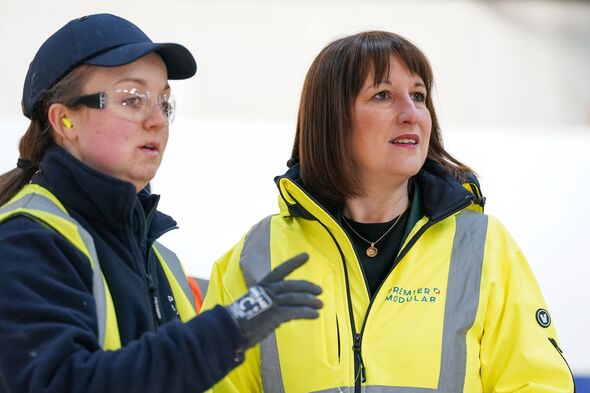
During meetings with city executives, Rachel Reeves is believed to have discussed limiting the cash ISA allowance from £20,000 to £4,000 a year.
There were reports following speculation that Reeves was considering scrapping the cash ISA in a bid to encourage more people to invest in the stocks and shares version of the tax-free savings account.
After the meeting on Thursday, The Guardian reported that Reeves said: “At the moment, there is a £20,000 limit on what you can put into either cash or equities, but we want to get that balance right.”
She added that she wanted to create “more of a culture in the UK of retail investing like you have in the US, to earn better returns for savers”.
Investing in stocks and shares, rather than cash, is more risky, but it would fit in with the Labour Government’s agenda of encouraging UK economic growth.
But major savings providers said they would fight any moves to scrap cash ISAs.
The Daily Express’ Harvey Jones wrote that some fund managers were lobbying Chancellor Rachel Reeve to focus more on the riskier version of the ISAs, which would boost their businesses.
The current ISA limit is £20,000, and it can be saved in either a cash or share version of the account.
According to The Guardian, more than 18 million people have a cash Isa, and almost £300bn is sitting in them. It pointed out that cash Isas are a key source of funding for banks and building societies, which use deposits to fund loans to households and businesses.
Nationwide, Britain’s biggest building society said scrapping any tax breaks cash Isas would reduce the availability of mortgages for first-time buyers.
Robin Fieth, the chief executive of the trade body the Building Societies Association, said many people were making a conscious decision to save in cash rather than stocks and shares.
Sarah Coles, head of personal finance at Hargreaves Lansdown, said cash ISAs were used by savers of all income brackets but tended to be opened by women, younger people, and those on below-average incomes.
She said: “Cash ISAs aren’t the gold-plated supercars of the financial world, exclusively for the super-rich, because there are all sorts of other people who can benefit from the tax savings – particularly at key moments in life.”
6 times in life when a cash ISA can be vital
1. When you retire and need to boost your emergency fund
When you’re working age, you should have cash to cover 3-6 months’ worth of essential expenses in an easy-access account. The sums different households need vary dramatically, but it’s not completely unreasonable to assume it could be around £2,000 a month – so some people might want to hold between £6,000 and £12,000 in easy access savings. Additional rate taxpayers pay tax from the first pound. Plus, higher-rate taxpayers with £10,000 or more in a competitive savings account are already in tax-paying territory. It means even someone on a relatively modest retirement income can benefit enormously from a cash ISA – and those saving at the top end will need to plan and use at least two years’ worth of allowances to protect their savings from tax.
2. When you’re planning for future care costs
However, if you are paying care costs at the moment or expect to in the near future and don’t have an immediate-needs annuity to pay the bills, it makes sense to hold the money in cash.
Some incredible sums are involved here, and it’s not unusual to need £30,000 available to cover costs in the coming year – pushing even basic rate taxpayers into the tax danger zone. It means cash ISAs can be highly sensible places for the money.
3. When you’re saving for a property deposit
At the other end of the spectrum, younger people on relatively low incomes are likely to be busy squirrelling money away for a property deposit. If they qualify for one, a Lifetime ISA is their first port of call because savings and investments are tax-free, and they benefit from the government bonus. However, if they’re one of the 40% of young people who get a cash injection from the Bank of Mum and Dad at this stage, it’s likely to come in a single lump sum, well over the £4,000 annual LISA allowance.
4. When you have money set aside for a tax bill
If you work for yourself, sensible financial planning means putting aside a portion of everything you earn during the year in order to cover your self-assessment tax bill. It’s also vital if you make other untaxed income, which will eventually be subject to tax – like dividends and interest on savings over your annual allowances.
The amounts of tax people pay vary dramatically, so interest on this money isn’t necessarily a tax issue for everyone. However, those with larger liabilities face the double whammy of needing to save to pay a tax bill and then potentially paying tax on those savings. By keeping the money in a cash ISA, they can protect themselves from this.
5. When you inherit
Some people use an inheritance to set aside cash in an emergency savings account. Others plan to spend it but will leave it in cash while they arrange the details. If, for example, they are planning property renovations, it can take well over a year for planning permission and for builders to become available. Some will eventually use the money to hit key goals, including pensions and investment.
6. When you expect your circumstances to change
You may be earning below a tax threshold right now, but be aware that a pay rise will likely push you over it while the thresholds are frozen. At that point, your personal savings allowance will halve or disappear overnight, and tax on savings interest may suddenly become an issue. Likewise, you may be building your savings, and while you’re not yet in tax-paying territory, you know you are heading towards it.
















